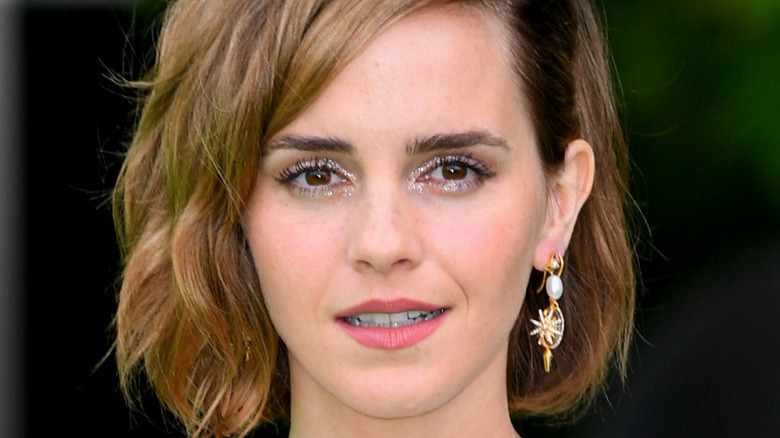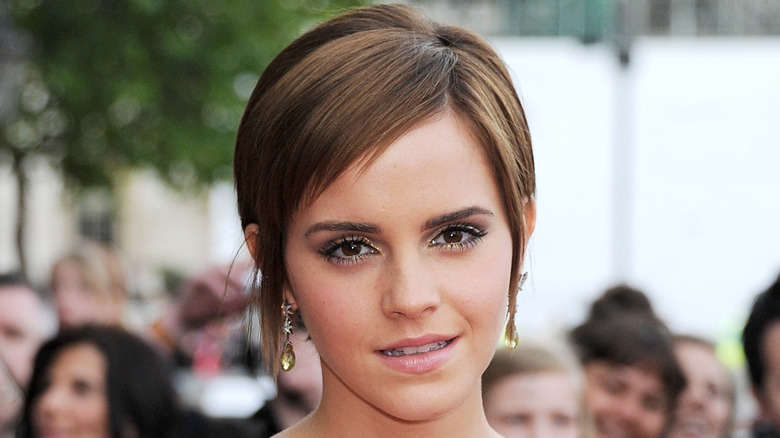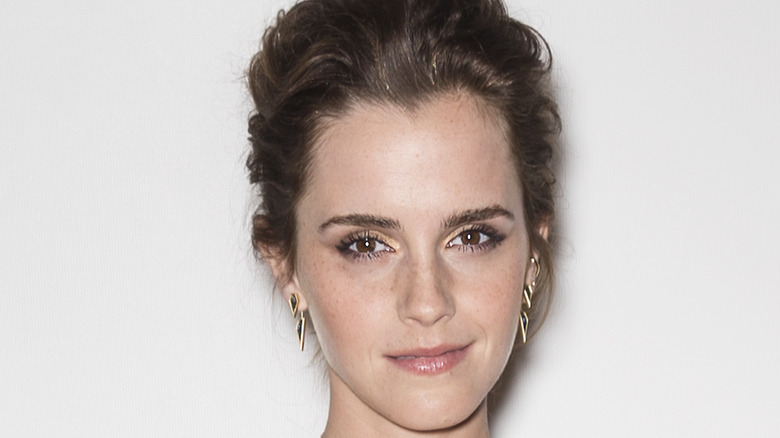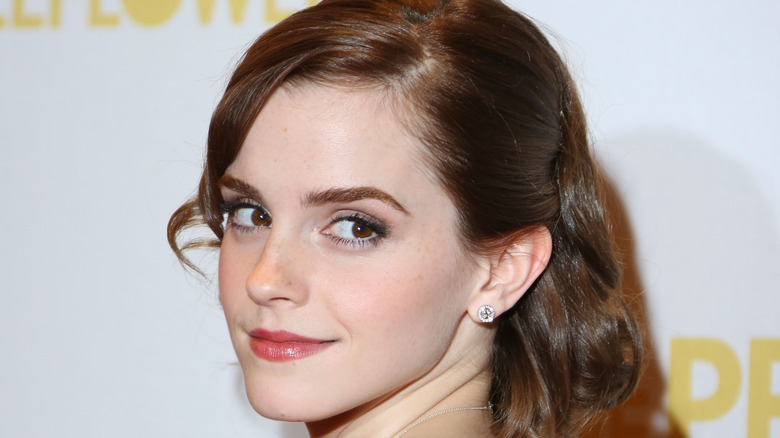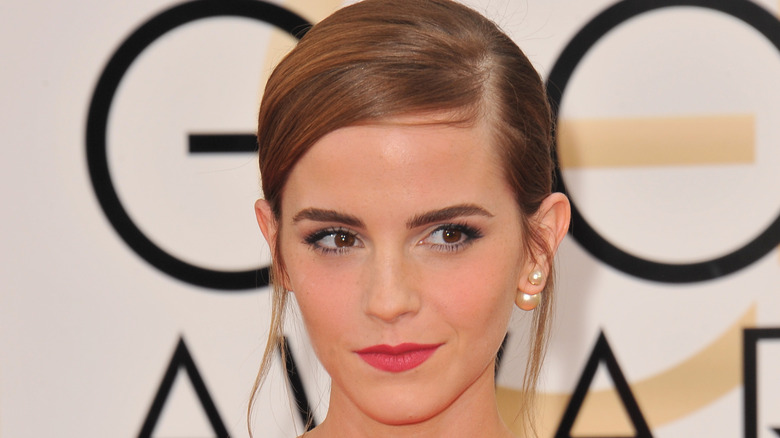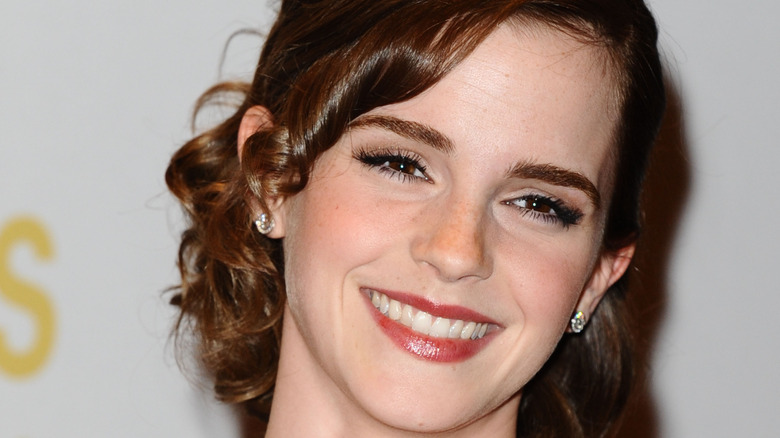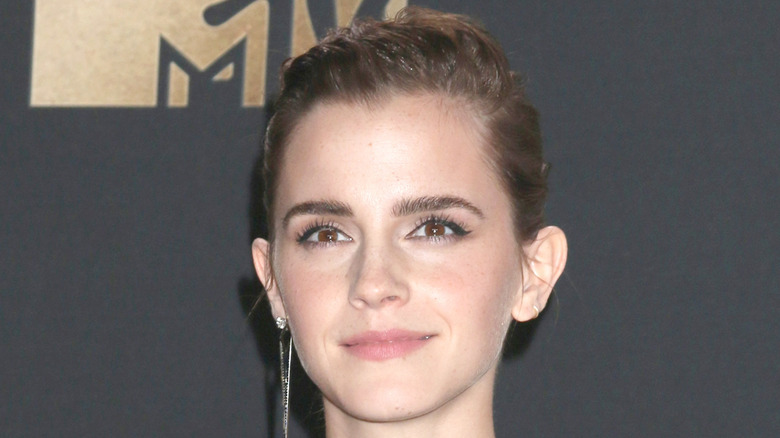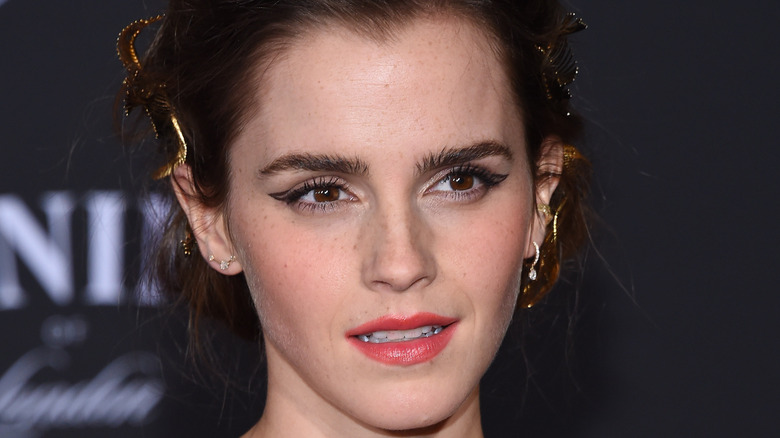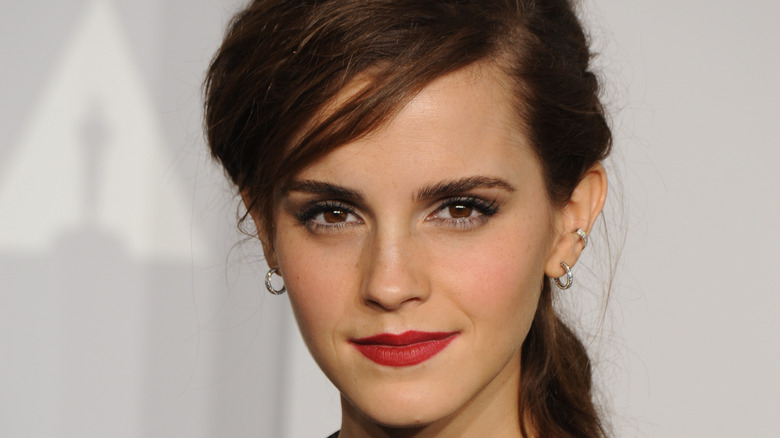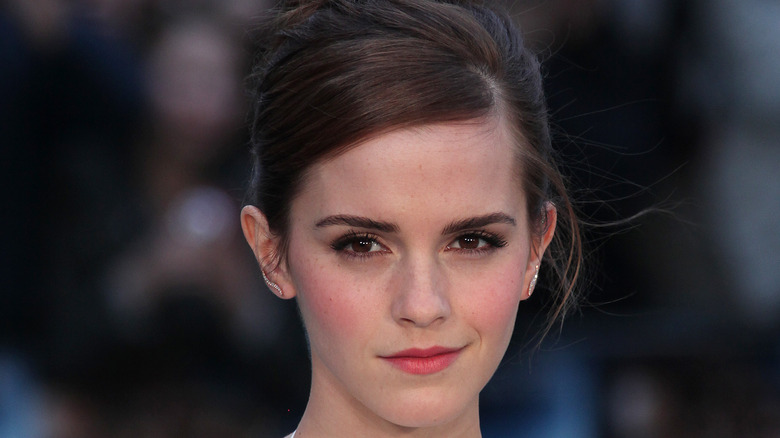Times Emma Watson Shut Down A Sexist Comment
British actor, model, and activist Emma Watson grew up playing the main female lead in the male-dominated "Harry Potter" film franchise. She was 11 years old when she first appeared on the big screen as Hermione Granger, and she spent a decade portraying the super-smart witch. After "Harry Potter" ended, she dove headfirst into a number of other successful projects, appearing in films including "The Perks of Being a Wallflower," "Beauty and the Beast," and "Little Women."
While the star is brilliant on-screen, it hasn't always been smooth sailing behind the scenes. "I have experienced sexism [in my career] in that I have been directed by male directors 17 times and only twice by women," Watson told The Guardian in 2015. However, she added, "Most of the problems I have encountered have been in the media, where I have been treated so incredibly differently from my male co-stars." As she has grown up and learned more about it, she has used her voice and platform to call out sexism whenever she's seen it or been forced to face it herself.
Her passion for equality has made the actor something of a feminist icon, and it culminated in her being named UN Women Goodwill Ambassador in 2014. The role has only made her more vocal and determined to speak out about feminism — even when critics didn't want her to. And when it comes to shutting down sexist comments, Watson has proved that she's perfectly capable of doing it without a silencio spell.
Emma Watson was bombarded with sexist comments when she cut her hair
After filming eight "Harry Potter" movies, Emma Watson was pretty bored with her hairstyle. Her character, the muggle-born witch Hermione Granger, was known for her brown bushy hair, so Watson had to keep her own tresses long for the role. "I didn't get to experiment with dyeing and chopping off my hair like most teenagers," she told Metro. But in 2010, after filming had wrapped on the final "Harry Potter" film, Watson had the freedom to change up her appearance as she wished. She said that she wanted to do something "drastic," so she chopped off her long locks in favor of a short pixie cut. This was a coming-of-age change that was exactly what the actor wanted. "I'm 20, I'm not a little girl anymore. I'd been on Harry Potter for ten years, so I needed to mark the end of it in some way," she recalled.
The sexist comments from male critics came flooding in after Watson debuted her new look. In 2012, she spoke to Glamour about the negative reaction her pixie cut received. "The majority of boys around me were like, 'Why did you do that? That's such an error.' And I was like, 'Well, honestly, I really don't care what you think.'" Watson has since had to grow out her hair for other acting roles but said that if she'd had it her way, she would have kept the shorter style long-term.
Her message for people who don't understand the meaning of feminism
In recent years, many people have embraced gender equality while saying that they don't believe in feminism, disavowing the term like it's a dirty word. In fact, a 2020 Pew Research poll found that 69 percent of respondents who identified as non-feminists agreed that it was "important for women to have equal rights with men." Emma Watson, being the feminist warrior that she is, spoke up about the misconceptions surrounding the word "feminism" in a HeForShe Facebook Live event in 2015. Her interviewer recalled his own experience with the word. "I'm trying to remember what I was like when I was 15," he said. "I was a 15-year-old boy, typical teenage boy. If someone said to you, 'Are you a feminist?' You would go, 'Well, obviously not.'"
Now, as an adult, he looks at things differently and acknowledges that wanting men and women to be treated equally does, in fact, make him a feminist. Watson responded to his revelation by explaining why some people who reject being labeled a feminist are wrong to do so. "I think men think it's a woman's word, that it's only for women," she said. "But it really just means that you believe in equality, and if you stand for equality, then you're a feminist. Sorry to tell you, you're a feminist."
How Emma Watson shut down critics of her Vanity Fair photo spread
To promote her 2017 film "Beauty and the Beast," Emma Watson did an interview with Vanity Fair. She also posed for a series of fashion photographs for the magazine, one of which saw her going semi-topless in a crocheted cape. Though the photographs were very artistic — and, more importantly, Watson's choice — the actor received a strong backlash for doing the shoot. Some critics labeled the "Perks of Being a Wallflower" star a "hypocrite" on Twitter, where British journalist Julia Hartley-Brewer also mocked her activism by writing, "Emma Watson: "Feminism, feminism... gender wage gap... why oh why am I not taken seriously... feminism... oh, and here are my t**s!"
But Watson hit back at those who chastised her for posing braless, pointing to the comments as proof of "what a misunderstanding there is about what feminism is" while speaking to Reuters. "Feminism is not a stick with which to beat other women with. It's about freedom, it's about liberation, it's about equality," she added. She also shut down most of her critics for good by refusing to let them shame her for showing a little skin. "I really don't know what my t**s have to do with it," she said.
The actor clapped back at Piers Morgan
One critic of Emma Watson's almost-topless Vanity Fair photograph wouldn't go quietly. According to British journalist Piers Morgan, the actor "exposed herself to some as a feminist fraud" by participating in the photoshoot. In a Daily Mail editorial, the former "Good Morning Britain" host further criticized Watson for her "brand of feminism," describing her as "someone who professes to want other women to have the 'freedom and liberation' to decide how they behave as feminists, but who actually wants to dictate to them how they behave as feminists." Morgan's argument was based in part on an interview Watson did in 2014 with Wonderland Magazine where she spoke about the videos Beyoncé released for her self-titled 2013 album. Morgan claimed that Watson had "decided that Beyoncé's brand of feminism was not the right brand of feminism."
Without mentioning his name, Watson clapped back at Morgan on Twitter. By sharing a highlighted copy of her Wonderland interview with her followers, she demonstrated how he had taken a few lines and spun the entire thing out of context. Watson did say that she felt "conflicted" about Beyoncé's videos because she thought that the camera provided a "male voyeuristic experience." However, she added, "The fact she wasn't doing it for a label, she was doing it for herself and the control that she has directing it and putting it out there, I agree is making her sexuality empowering because it's her choice."
Emma Watson had to fight to use the word 'feminism' in her UN speech
As part of her role as UN Women Global Goodwill Ambassador, Emma Watson delivered a thought-provoking speech on gender equality and the purpose of the UN's HeForShe campaign in 2014. However, the actor-turned-activist has since revealed to Porter that she had to fight to deliver her now-famous speech the way she wanted to — and that she was told to omit a certain word altogether. "I was encouraged not to use the word 'feminism' because people felt that it was alienating and separating, and the whole idea of the speech was to include as many people as possible," she explained (via Evening Standard).
That request, which was steeped in internalized sexism, could have caused Watson to censor herself, thus potentially lessening her speech's impact. But thankfully, her desire to erase the stigma attached to the word "feminism" gave her the strength to reclaim it (she used the word three times, in case you're wondering), and her first UN speech was a rousing success. "I thought long and hard, and ultimately felt that it was just the right thing to do," she said. "If women are terrified to use the word, how on earth are men supposed to start using it?"
The Harry Potter star shut down The Sun's sexist column
Unfortunately, all forms of feminism and activism inevitably attract critics. Less than a week after Emma Watson delivered her gender equality speech at the UN in 2014, British journalist Rod Liddle wrote a sexist column about it in The Sun, where he criticized the actor. "HERMIONE GRANGER has been addressing the United Nations General Assembly. Nope, not kidding. ... she bored them all rigid with whining, leftie, PC crap. Just like all actresses do if people are stupid enough to give them a chance," he wrote.
Watson quickly shut down Liddle's column, though not with her words. Letting her hard work and campaigning speak for itself, she simply shared details of her latest project in a possible bid to counter his sexist and derogatory comments. "Excited to show you this small film I helped make. Hope it gets you going! #Hurdles #GenderEqualityTogether," she wrote on Twitter. Watson lent her voice to the aptly titled short film "Hurdles," which is about the sexism and other "obstacles" that women all across the globe face in life. "We've sacrificed, fought, campaigned, succeeded, been knocked back, and succeeded again," she says in the clip. In other words, comments like Liddle's aren't likely to hold her back.
Emma Watson stopped this comment about 'male' jobs in its tracks
Actor Emma Watson is renowned for being a vocal feminist on and off the screen — after all, just look at how she balances playing strong female characters like Belle and Meg March alongside fulfilling her role with the UN. As part of her work for the organization, Watson participated in a HeForShe Q&A on Twitter in 2015. The actor asked fans to share their personal questions about gender equality with her.
Watson responded to a now-deleted tweet from a young female fan who shared her dream of becoming an engineer when she got older. The fan revealed that her dad told her that the job was one that only men could do (per HuffPost), so she asked Watson for her help. The actor's response perfectly shut down the sexist idea of pink and blue jobs. "Become an engineer," she replied. Support for her answer flooded in from other fans. A response from one woman read, "30 years ago I was told to become a secretary. I became a global engineering manager." Another fan wrote, "As an engineer I'm so proud that more women want to join the field. Let's show the men how it's done!"
The activist responded to sexist societal pressures by calling herself 'self-partnered'
The amount of pressure on young women to have their whole lives figured out before they reach the age of thirty is not only unrealistic, but it's also inherently sexist because most men are generally not subjected to the same pressure. Emma Watson called it "this bloody influx of subliminal messaging around" during a 2020 Vogue interview, and even someone as successful as her isn't immune to such pressure. "If you have not built a home, if you do not have a husband, if you do not have a baby, and you are turning 30, and you're not in some incredibly secure, stable place in your career, or you're still figuring things out ... There's just this incredible amount of anxiety," she said.
So, while sexist commentary isn't always direct, even powerful women like Watson feel the pressures of lingering patriarchal expectations. She has managed to make peace by deviating from societal expectations, though, and now she uses her platform to call out this sexist social pressure, which sometimes makes women feel like they need to be in a relationship to prove their worth. However, Watson coined a new term to describe being single and perfectly content: "self-partnered."
Emma Watson talked about feminism in a men's magazine
While promoting "The Circle," a 2017 techno-thriller that she starred in alongside Tom Hanks, Emma Watson spoke about feminism, activism, and her HeForShe campaign for a piece published in the men's magazine Esquire. During the interview, the actor also called out sexist behavior in the entertainment industry. "You hear of studio heads being like, 'we can't have a woman directing an action movie,' or just sticking to these archaic notions of what a woman will and won't be able to do," she said.
While the interview was still happening, the actor's comments about feminism were already causing a stir at the men's magazine. "Isn't Esquire a slightly odd place to be having this discussion?" her interviewer asked. "Well, that's part of the reason I pushed so hard for it," Watson fired back. "So often, feminist issues are being discussed in a room labeled for women, with women, talking about women's issues, focusing on women." However, the actor argued that this is not the way things should be, and she pointed out that the purpose of the HeForShe campaign is to make people understand why women's issues should matter to everyone. She added, "This is affecting men, too. I want to really talk to men about it."
How she shut down online trolls
Online trolls are nothing new for actor and feminist activist Emma Watson. The "Little Women" star has previously taken to Twitter to shut down accusations that she's "a white feminist" who doesn't take into consideration the experiences of intersectional feminists. But she isn't always able to shake the trolls who persist in sending sexist comments her way. From those who have dismissed the actor as a "difficult" woman to others who have criticized her for "using" Alan Rickman's death to "fuel the feminist agenda bandwagon," per Daily Mail, Watson has experienced a slew of sexist comments online.
During her 2016 Esquire interview, Emma Watson took the opportunity to shut down her online trolls for good. "Call me a 'diva', call me a 'feminazi', call me 'difficult', call me a 'First World feminist', call me whatever you want. It's not going to stop me from trying to do the right thing and make sure that the right thing happens," she said. Thank goodness this feminist icon isn't letting those trolls keep her down. Spreading awareness of gender equality is the best way to keep proving her point.
Emma Watson responded to the media's obsession with her marital status
Being the global star that she is, it's not surprising to see Emma Watson's name in headlines. But there's a constant cycle of news articles about the star, covering everything from her career to her fashion choices and her relationship with her boyfriend Leo Robinton. The couple, who have been together for over a year as of this writing, have faced a constant slew of articles speculating about the status of their relationship, per Elle. Some outlets have even published pieces about their supposed engagement. "Emma Watson heads out with rumored fiancé Leo Robinton after mounting speculation she is putting down roots in Los Angeles," read a May 2021 Daily Mail headline.
The actor wasted no time in addressing this and many other made-up headlines. "Rumors about whether I'm engaged or not, or whether my career is 'dormant or not' are ways to create clicks each time they are revealed to be true or untrue," she wrote on Twitter. "If I have news – I promise I'll share it with you," she added.

